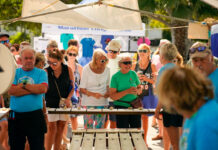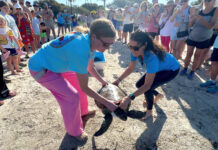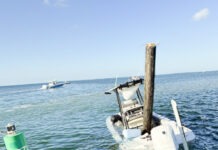
Lionfish are some of the most iconic invasive species of the Florida Keys. They’re beautiful, they’re venomous and they’re hungry. Luckily for us humans, they’re also fun to catch and tasty.
Reef Environmental Education Foundation (REEF) has hosted the annual Upper Keys Lionfish Derby every year to catalyze divers and spearfishers to protect the reefs against lionfish. This year, the 11th, will be held as a socially-distant derby from Thursday, Sept. 10 through Sunday, Sept. 13.
“Lionfish are voracious predators and opportunistic,” said Allie Candelmo, REEF’s conservation science manager and resident lionfish expert. “They consume a lot of prey throughout the day and evening, which has led to dramatic declines in biodiversity and abundance of native populations when left unchecked.”
In a short amount of time, lionfish can eat the small benthic fish that help a reef thrive and maintain balance. Because they’re not from here, they also don’t have natural predators to keep their densities low, resulting in crashing populations of native fish, Candelmo said. As if that wasn’t enough, they also have high thermal tolerances and a very wide range, which has allowed them to adapt to live year-round from North Carolina all the way through the southern Caribbean.
“You can find them anywhere from 1 meter to 300 meters in depth,” said Candelmo, and everywhere in that range, they’re busy eating and reproducing.

REEF’s lionfish derbies began in 2009 in the Bahamas and in 2010 in Florida as an effort to get a handle on this prickly problem. Today there are derbies throughout the state.
A recent study by REEF staff in the Bahamas and the Keys found a 50% reduction in lionfish population in popular fishing areas from before and after derbies, Candelmo shared.
“Derbies have been shown to be effective and provide community and motivational push for divers and teams to go out and remove lionfish,” she said. “We hope they will continue to do so throughout the year and have small impacts locally.”
More than 40,000 lionfish have been removed through REEF-supported derbies.

Teams are between two and four people, and can register online. Registration is $75 per team through Sept. 6 and $100/team through Sept. 10.
Derby participants can hunt lionfish from sunrise to sunset on Friday, Sept. 11 and Saturday, Sept. 12. Following all federal and state fishing regulations, lionfish may be collected by netting or spearing while diving, snorkeling, or free diving. Participants can dive from a private vessel or with a dive operator. Key Dives in Islamorada is offering lionfish hunting charters on Saturday and Sunday. Interested participants should contact dive shops directly to book dives.
A mandatory captains’ meeting will be held at 5:30 p.m. Thursday, Sept. 10. The meeting will cover lionfish ecology, safe collecting and handling techniques, permits and regulations. Interested teams can schedule an appointment to come into REEF headquarters in Key Largo to get permits and a special lionfish flag.

Two contactless lionfish drop-off stations will be staffed throughout the weekend. Stations are located at the REEF Campus in Key Largo and Mote Marine Laboratory on Summerland Key. All fish must be dropped off no later than 10 a.m. on Sunday, Sept. 13. Middle Keys teams wanting to participate can also contact organizers for a potential midway pickup.
Prizes include over $3,100 in cash awards, spears and other lionfish gear. Cash prizes will be awarded to teams who harvest the most, largest and smallest lionfish. The “most lionfish” category will include a competitive “Apex Predators” division and a more casual “Reef Defenders” alternative, she said. Teams may register in either division.
Sponsors include Ocean Reef Conservation Association, Florida Fish and Wildlife Conservation Commission, Postcard Inn Beach Resort and Marina, and Mote Marine Laboratory. All activities occur within NOAA Florida Keys National Marine Sanctuary under permit.
For more information and to register, visit https://www.REEF.org/2020derby or call 305-852-0030.
flyer sample-2020 Upper Keys Lionfish Derby






















